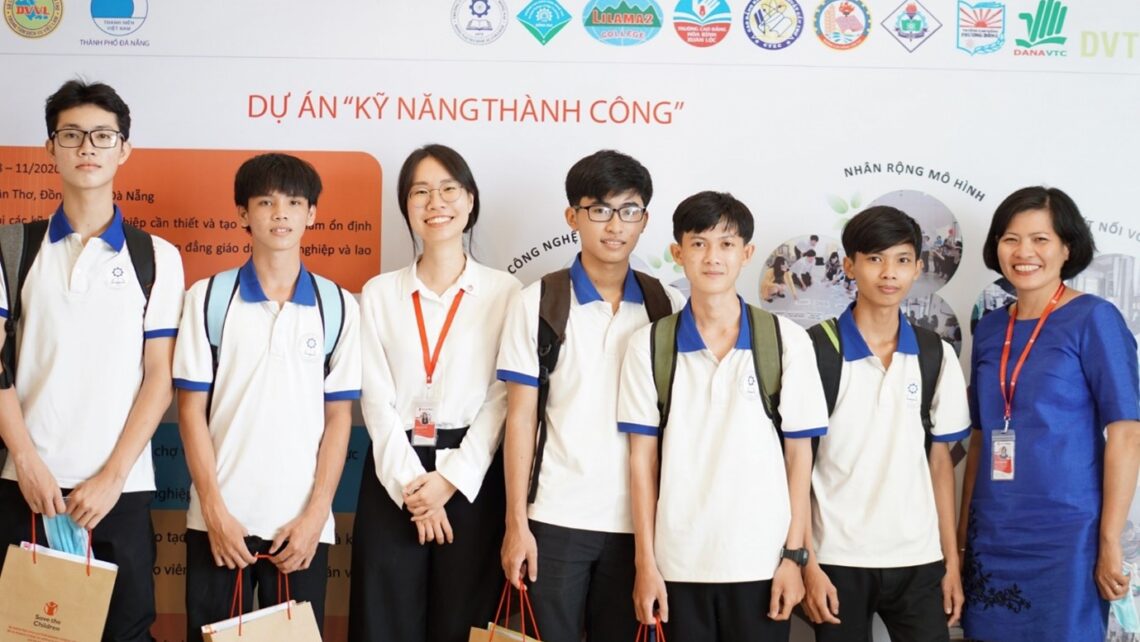Context:
Viet Nam is currently experiencing the tail end of the demographic dividend, with this window still offering unprecedented socioeconomic opportunities. However, Vietnamese youths’ capacity remains largely underutilized, as evidenced by 6.2 per cent of youth being unemployed in 2023. Exacerbating the issue, with only 20 per cent of youth reported to have received vocational training, shortages of soft and technical skills within the workforce are hindering youths’ ability to meet job market demands. Consequently, to capitalize on this limited opportunity, there is an urgent need to bridge the skills gap, with an additional focus on disadvantaged youth required in order to overcome the elevated employment and opportunity barriers they face.
Implementation of Programme / Initiative:
Skills-to-Succeed (S2S) Vietnam, an initiative launched by Save the Children, aims to facilitate youth transitioning into the job market. Through leveraging the Theory of Change Model, S2S helps youth develop their core competencies and provides them with employment linkages to help them secure good jobs or build their businesses. Moreover, in alignment with SDG 8 and prospects for inclusive economic growth, this programme focuses on disadvantaged youth, namely migrants from urban and peri-urban communities, with a vision to dismantle intergenerational poverty cycles. With support from numerous partners and donations from organizations such as Accenture and Comic Relief, S2S has trained over 155,000 youth across Viet Nam and six other countries (Bangladesh, China, Egypt, Indonesia, Mexico and the Philippines), with 107,131 youth having started their own business or secured an apprenticeship or job since 2011.
Main Challenge:
Following an evaluation conducted by the Centre of Research and Evaluation (CORE), results revealed that, whilst employment rates, satisfaction, security and financial independence improved in the short term for female Vietnamese youth, these benefits were not sustained. Correspondingly, with greater longevity maintained among their male counterparts, the results highlighted a persistent gender employment gap. Consequently, S2S pledged to conduct additional research to identify the systemic and contextual determinants that influence female youth to ‘drop-out’ of employment. Furthermore, recommendations were made for the programme to additionally work with spouses or parents of young females to change gender attitudes.
Results Achieved:
Between 2014 and 2020, the Vietnamese S2S programme empowered 7,571 youth with employability training, resulting in 5,477 individuals securing jobs and 326 starting their businesses. Correspondingly, the aforementioned evaluation revealed numerous statistically significant advancements. For example, following programme implementation, employment rates increased from 41 to 80 per cent in the short term and 69 per cent in the long term. Moreover, emotional job security rose from 83 to 95 per cent in the short term, with a very significant increase in job satisfaction from 53 to 90 per cent in the long term. Lastly, financial independence surged from 14 to 56 per cent in the short term following programme completion.
Moving Forward:
The Vietnamese S2S division has recently achieved significant progress in expanding the programme’s reach through the implementation of an Employability Skills E-Learning programme. Correspondingly, the flexible and digitalized nature of E-Learning enables the programme to engage with a broader audience, with 122 schools across 33 Vietnamese provinces having access to the course since 2021. Evidencing this reach, at the end of its first year, 3,280 students enrolled on the course, with 2,734 completing the programme. Notably, this course was the only one which remained uninterrupted during the COVID-19 pandemic, which, in conjunction with its cost-effectiveness, underscores the potential sustainability of the programme.
Replicability:
The capacity of this programme to be replicated has been demonstrated by its success in numerous other countries. However, as indicated by the differing variations of the programme, S2S recognizes that a one-size-fits-all approach is ineffective. Accordingly, acknowledging the influential capacity of context, S2S actively participates with local partners through surveys, interviews and focus groups to tailor programmes to the nuanced needs of each community. Facilitating effective replicability further, through both broader and country-specific research and evaluations of the programme, S2S can identify good practices as well as areas for adaptation, to ensure relevancy and efficacy in different environments.
References:
- https://vietnam.unfpa.org/en/topics/population-matters-2
- https://www.statista.com/statistics/813167/youth-unemployment-rate-in-vietnam/#:~:text=In%202023%2C%20the%20youth%20unemployment,to%206.2%20percent%20in%202023.
- https://hr.asia/asean/urgent-need-to-improve-vietnams-young-labourers-skills/
- https://resourcecentre.savethechildren.net/document/skills-succeed-program-achievements/#:~:text=Skills%20to%20Succeed%20(S2S)%20equips,the%20intergenerational%20cycle%20of%20poverty.
- https://resourcecentre.savethechildren.net/pdf/vietnam_e-learning_briefer_final.pdf/
- https://resourcecentre.savethechildren.net/document/final-evaluation-report-save-children-skills-succeed-s2s-global-grants-4-and-5-mexico/
- https://resourcecentre.savethechildren.net/document/improving-the-lives-of-youth-results-from-the-skills-to-succeed-program-final-evaluation-brief/
This good practice was kindly prepared by Ms. Sorcha Bates
Project Details
Date: September 23, 2024
